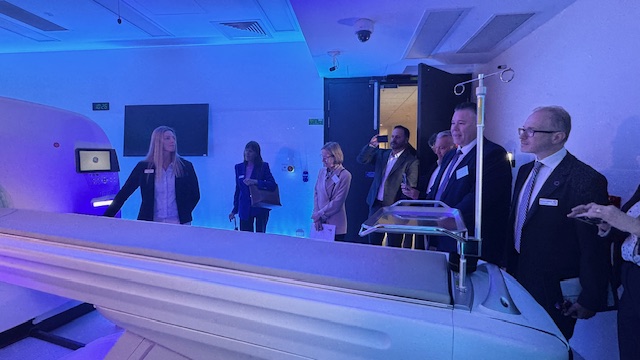Peter Mac has installed a cutting-edge GE HealthCare total body PET/CT technology and will advance precision medicine via two new research centres, thanks to $15 million in new grants and funding support.
Australian Cancer Research Foundation (ACRF) has generously provided $12 million across two grants, plus enabling funding also from the National Imaging Facility (NIF), and The University of Melbourne.
This has funded the installation of latest technologies and the founding of two new centres to advance innovative research programs both in precision medicine. The new centres, which officially launch today, are the:
- ACRF Centre for Advanced Imaging-Guided Therapeutics
- ACRF Centre for Cellular Imaging of Precision Immunotherapy
Peter Mac’s Acting Chief Executive Karen Fox said the new centres would place Australia at the global forefront of precision medicine, which is about moving away from “one-size fits all” therapeutic approaches.
“The next frontier in cancer treatment goes beyond delivering proven therapies for each cancer type – it’s about tailoring and optimising treatment strategies for each individual patient,” Ms Fox says.
“These new centres will accelerate the development of advanced imaging techniques and enhance our ability to predict how patients will respond to immunotherapy – ensuring more people can benefit from precision medicine.
“Australian Cancer Research Foundation, the National Imaging Facility, University of Melbourne, and GE HealthCare are thanked for their outstanding support that will ultimately lead to better outcomes for cancer patients and more lives saved.”
The ACRF Centre for Advanced Imaging-Guided Therapeutics ($9 million from ACRF) will accelerate development of pioneering cancer diagnostics and therapeutics, improving outcomes across all cancer types.
At the core of this Centre is the first cutting-edge total body PET/CT technology developed and manufactured by GE HealthCare. Peter Mac is the first site to install this new technology globally.
This technology is designed with the goal of enabling whole-body imaging with low radiation doses and fast acquisition times. It will be used to advance a program of research into novel tracers used to detect and monitor cancer.
Further funding was also received from The National Imaging Facility ($1.75 million) and The University of Melbourne ($900,000).

The new Centre is headed by Professor Michael Hofman, Director of the Prostate Theranostics and Imaging Centre of Excellence (ProsTIC) at Peter Mac and Peter Mac’s Director of Medical Oncology, Professor Linda Mileshkin.
“The new GE HealthCare total body PET/CT technology is designed to capture the entire body in a single scan – important factors in producing ultra-fast, crystal-clear images that reveal disease in remarkable detail and will transform how we diagnose, treat, and understand cancer,” says Professor Michael Hofman.
“When I started in medicine 25 years ago, a PET scan took over 90 minutes to perform limiting availability to only a few patients with cancer. We now expect to scan a patient’s whole body in a fraction of this time or capture how drugs move simultaneously to help unlock a new era of precision medicine.”
“We’re thrilled to have this world-first scanner installed at Peter Mac where it will be used for research to improve outcomes for Australians with cancer and, globally, help to shape the future of clinical practice,” Prof Hofman says.
The ACRF Centre for Cellular Imaging of Precision Immunotherapy ($3 million from ACRF) will apply cutting-edge imaging technologies aiming to unlock the full potential of immunotherapy – which uses a person’s immune system to fight their cancer.
Headed by Professors Belinda Parker and Ilia Voskoboinik, this Centre aims to discover why immunotherapy effectiveness can vary from person to person, from being potentially curative to having little therapeutic benefit.
“Immunotherapy is becoming established as another major pillar of cancer treatment – alongside surgery, chemotherapy, radiotherapy, and targeted drug therapies – and our understanding of how it works, and factors that limit effectiveness, is emerging,” Professor Parker says.
“It is vital that we find new ways to personalise this treatment approach, as we believe we can expand the number of patients with advanced cancers that could achieve long term responses to immunotherapy”.

ACRF has been a long-standing supporter of Peter Mac. The latest $12 million follows more than $10.8 million provided since 2003 to install cutting-edge equipment and infrastructure ensuring Peter Mac scientists, and people with cancer, can benefit from very latest technology.
“We are delighted to enable this cutting-edge technology for top cancer researchers to potentially transform outcomes for people diagnosed with cancer,” says ACRF CEO Kerry Strydom.
“Supporting new/improved technologies to pursue, explore and advance their innovative ideas and scientific hypotheses will ultimately save lives and improve the quality of life for people being treated for this devastating disease.”
The National Imaging Facility (NIF) is a national research infrastructure, funded by the Australian Department of Education under the National Collaborative Research Infrastructure Strategy (NCRIS), whose mission is to make cutting-edge imaging capabilities accessible to Australian researchers and industry.
“The investment in the new GE Healthcare total body PET/CT technology supports NIF’s goal of enabling significant impacts on Australia’s health challenges, as demonstrated for cancer research today, and accelerating innovation,” says NIF’s CEO Professor Wojtek Goscinski.
The GE Healthcare total body PET/CT technology at Peter Mac will be integrated into NIF’s ‘Human Molecular Imaging Network’ – an Australia-wide network that supports nationally significant research in cancer, dementia and the development of new radiopharmaceuticals.
Installing this technology at Peter Mac situates it at the intersection of patient care, translational research and fundamental science, aiming for long-term impact in improving cancer outcomes for Australians. Integrating it within NIF will make the scanner accessible to researchers across the country.
“We are incredibly proud to see our total body PET/CT technology installed at Peter MacCallum Cancer Centre – one of the world’s leading cancer research and treatment institutions,” shares Jean-Luc Procaccini, President and CEO, Molecular Imaging and Computed Tomography, GE HealthCare.
“This milestone represents a shared commitment to advancing oncology innovation and helping improve patient outcomes. Together, we’re helping unlock new possibilities in whole-body imaging and accelerating the future of cancer care.”